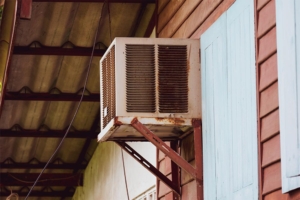Upgrading Your Air Conditioner: When to Consider It and Why
 As a homeowner, you’re always looking for ways to enhance the comfort and value of your home. One crucial aspect that plays a significant role in your daily comfort is your air conditioning system. While your current air conditioner may have served you well over the years, there comes a time when upgrading becomes not just beneficial but necessary.
As a homeowner, you’re always looking for ways to enhance the comfort and value of your home. One crucial aspect that plays a significant role in your daily comfort is your air conditioning system. While your current air conditioner may have served you well over the years, there comes a time when upgrading becomes not just beneficial but necessary.
1. Understanding the Lifespan of Your AC Unit
The lifespan of a typical air conditioner ranges from 10 to 15 years. However, this can vary based on the brand, model, usage patterns, and how well it has been maintained. Regular service can extend your AC’s life, but even the best-maintained units will eventually need to be replaced.
Signs It’s Time for an Upgrade:
- Frequent Repairs: If you find yourself calling the HVAC technician more often than you used to, it’s a sign that your AC is on its last legs.
- Increasing Energy Bills: An old or malfunctioning unit can become less efficient, causing your energy bills to creep up.
- Inadequate Cooling: If some rooms are too hot while others are too cold, or if your AC can’t keep up with the heat, it might be time for an upgrade.
- R-22 Refrigerant: If your current system uses R-22 refrigerant (which is being phased out due to environmental concerns), you should consider upgrading to a newer, more eco-friendly model.
2. The Benefits of Upgrading Your Air Conditioner
Upgrading your air conditioner is a significant investment, but it brings numerous benefits that can improve both your home life and your wallet.
Improved Energy Efficiency
New air conditioners are required to have a Seasonal Energy Efficiency Ratio (SEER) of at least 14, which is a measure of the air conditioner’s efficiency. Newer models can have SEER ratings as high as 20 or more, meaning they use less energy to cool your home more effectively. This higher efficiency can lead to substantial savings on your energy bills.
Enhanced Home Comfort
Modern air conditioners are not only more efficient but also better at regulating temperature and humidity. They provide a more consistent indoor climate and improved air quality, thanks to advanced filtration systems that can reduce allergens and pollutants in the air.
Smart Home Compatibility
Many new AC units come with smart features that allow you to control your system remotely via a smartphone app. You can adjust temperatures, set schedules, and monitor your system’s performance from anywhere, providing both convenience and further opportunities for energy savings.
Increased Home Value
Upgrading your AC can also increase the resale value of your home. A new, efficient air conditioning system is an attractive feature for potential buyers should you decide to sell your home in the future.
3. Choosing the Right AC for Your Home
When considering an upgrade, choosing the right system for your home is crucial. Here are a few tips to help you make the best choice:
- Size Matters: An AC that’s too large or too small for your home can lead to inefficiency and more wear and tear on the system. A professional HVAC contractor like Jacobs and Rhodes can perform a detailed load calculation to determine the appropriate size.
- Check for Rebates: Some energy-efficient models may qualify for rebates or tax credits. Research or ask your HVAC provider about any incentives that could help offset the upfront cost.
- Consult a Professional: An HVAC professional can provide valuable advice on the type of system that would best suit your needs, considering factors like your home’s layout, size, and existing ductwork.
4. Preparing for Your AC Upgrade
Once you’ve decided to upgrade, preparing your home and choosing the right time for installation is important.
- Schedule During Off-Peak Seasons: Consider scheduling the installation during spring or fall when HVAC companies are less busy. This can often result in quicker service and potentially lower costs.
- Prepare Your Home: Ensure that the area around your current AC unit is clear and accessible for the technicians. This can help speed up the installation process and prevent any delays.
Conclusion
Upgrading your air conditioner is a decision that comes with significant benefits. Not only does it enhance your comfort and improve the air quality in your home, but it also increases your home’s value and can provide substantial energy savings. If you’re experiencing signs that your AC unit may be nearing the end of its life, or if you’re looking for more efficiency and comfort, consider an upgrade.
At Jacobs and Rhodes, we understand the importance of a reliable and efficient air conditioning system. Contact us today to discuss your options and how we can help you achieve the perfect climate for your home.

 Jacobs and Rhodes
Jacobs and Rhodes Jacobs and Rhodes
Jacobs and Rhodes